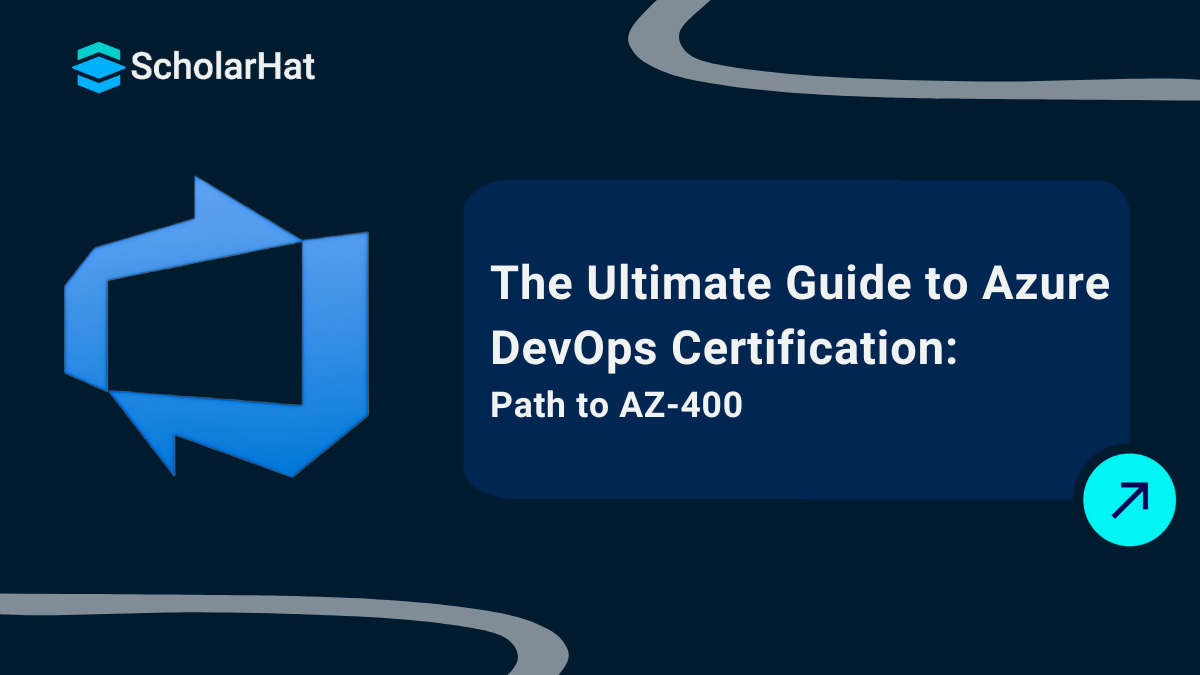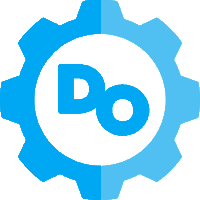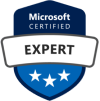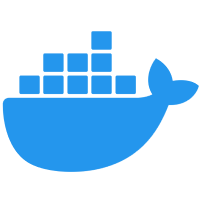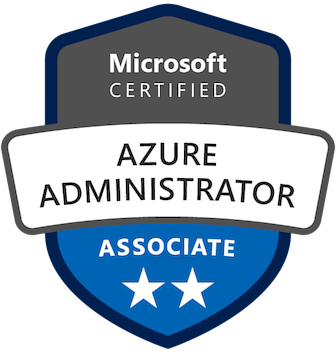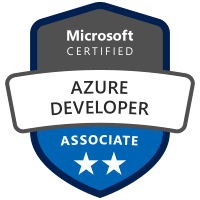18
AprAzure DevOps Certification Path (Az 400 certification)
Azure DevOps Certification Path for Beginners
Azure DevOps Certification is necessary for developers who want to effectively plan software development and IT operations. It smooths the development, testing, and deployment processes, allows continuous integration and delivery at a high tempo, and facilitates team collaboration in frictionless information sharing. Azure DevOps provides a suite of tools with integrated mechanisms that allow version control, tracking projects, automation, and tests without additional overhead.
In this Azure DevOps tutorial, I will cover the various learning paths for DevOps certifications, how it makes the adoption of DevOps easy by providing seamless workflows, and why mastering it is important to developing, deploying, operating, and managing scalable and secure cloud solutions.
Read More: DevOps Engineer Salary in India
What is Azure DevOps certification?
- Azure DevOps Certification shows you how to use Microsoft’s DevOps tools for software development and IT operations.
- It proves that you can make development, testing, and deployment easier and faster.
- With this certification, you learn key skills like continuous integration (combining code often), continuous delivery (releasing code to production), version control (tracking code changes), automation (using tools to do tasks automatically), and project tracking (keeping track of progress).
- It also helps you follow good teamwork and quality practices.
Importance of AZ-400 certification
- Industry Demand: More companies are using DevOps methods. Certification shows you understand modern development and operations.
- Career Growth: It opens doors to jobs in DevOps and cloud management, making you more competitive in the job market.
- Efficient Processes: You learn how to improve development, testing, and deployment, saving time and reducing mistakes.
- Teamwork: It helps you bring development and IT teams together, improving communication and project success.
- Scalability: You learn how to build solutions that can grow easily, which is important for cloud work.
- Adaptability: Certification keeps your skills up-to-date with new technologies, making you a valuable part of any team.
Why Pursue the Azure DevOps Certification(Benefits)?
Pursuing Azure DevOps Certification is helpful for several reasons:
- In-Demand Skills: You gain valuable skills in DevOps that many companies look for.
- Career Growth: It helps you qualify for better jobs in DevOps and cloud roles, possibly with higher pay.
- Improved Efficiency: You learn how to make development and operations work better together, speeding up software delivery and reducing mistakes.
- Better Collaboration: The certification shows you how to help teams work together more effectively.
- Cloud Skills: You get hands-on experience with Azure DevOps tools, which is important for managing cloud applications.
- Stay Current: You stay updated on new DevOps practices, helping you stay valuable in the tech field.
Who can pursue Azure DevOps certification?
Azure DevOps Certification is for various professionals, including:
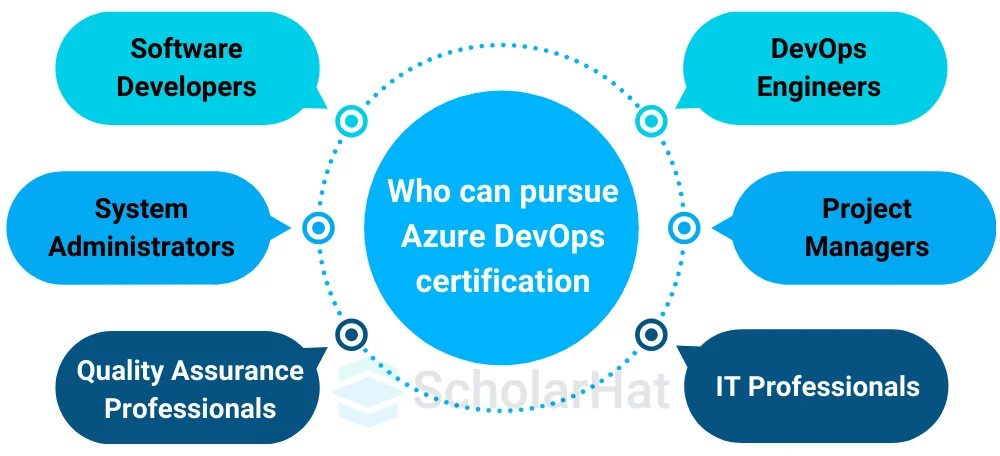
- Software Developers: If you want to deliver software faster and better.
- DevOps Engineers: If you want to prove your skills in using Azure DevOps tools for automation.
- System Administrators: If you want to manage deployments and operations better with DevOps.
- Project Managers: If you want to lead development teams more effectively by understanding DevOps.
- Quality Assurance Professionals: If you want to include testing in the DevOps process to improve software quality.
- IT Professionals: If you work in IT and want to move into DevOps or cloud development.
Top 4 Azure DevOps certifications path
| Certification | Description | Prerequisites | Recommended Training |
| Microsoft Certified: Azure Fundamentals | Entry-level certification covering basic Azure concepts. | None | Microsoft Learn, Online Courses |
| Microsoft Certified: Azure Administrator Associate | Focuses on managing Azure resources and services. | Azure Fundamentals recommended | Microsoft Learn, Hands-on Labs |
| Microsoft Certified: Azure Developer Associate | This is for developers who build and maintain Azure applications. | Azure Fundamentals recommended | Microsoft Learn, Coding Projects |
| Microsoft Certified: Azure Solutions Architect Expert | Advanced certification for designing solutions on Azure. | Azure Administrator or Developer Associate | Microsoft Learn, Case Studies |
Let's explore them in detail one by one.
1. Fundamentals - Azure Certifications
Microsoft Azure Fundamentals AZ-900

Skills Measured
- The Microsoft Azure AZ-900 exam checks your knowledge of important Azure concepts.
- You will learn about cloud computing basics and the different types of cloud models.
- It covers core Azure services like virtual machines and app services, as well as security features and compliance.
- You will also understand Azure pricing, service-level agreements (SLAs), and cost management tools.
- This knowledge helps you get a solid foundation in using Azure effectively.
Exam Details
- Eligibility: No prior Azure experience is required
- Exam duration: 60 mins
- No. of questions: 40-60 questions
- Passing score: 700 out of 1000 (70%)
- Exam languages: English, Korean, Chinese, Japanese, Arabic, etc.
You will have the option to retake the exam within 24 hours if you fail on the first attempt. The second attempt can be taken only after 14 days, with a total of 5 retakes allowed in the span of a year.
Certification Structure
The AZ-900 certification (Microsoft Azure Fundamentals) helps you understand the basics of cloud computing and Azure. It covers:
- Cloud Basics: Learn about different types of cloud services like servers, storage, and apps.
- Azure Services: Get to know key tools like virtual machines, storage, and networks.
- Pricing and Support: Understand how Azure pricing works, as well as ways to manage costs and service guarantees.
- Security and Rules: Find out how Azure keeps data safe and meets compliance standards.
It's perfect for beginners, and you don’t need any prior experience.
2. Associate - Azure Certifications
Microsoft Azure Administrator AZ-104

Skills Measured
- The Microsoft Azure AZ-104 Certification exam tests your understanding of managing Azure resources.
- You will learn how to manage Azure subscriptions and accounts, deploy storage solutions, and set up virtual networks.
- It also explains how to safeguard identities and manage Azure governance.
- This expertise enables you to efficiently manage Azure environments.
Exam Details
- Eligibility: Some prior Azure experience is recommended but not required.
- Exam duration: 150 mins
- No. of questions: 40-60 questions
- Passing score: 700 out of 1000 (70%)
- Exam languages: English, Korean, Chinese, Japanese, Arabic, etc.
You will have the option to retake the exam within 24 hours if you fail on the first attempt. The second attempt can be taken only after 14 days, with a total of 5 retakes allowed in the span of a year.
Certification Structure
The Microsoft Azure AZ-104 certification (Microsoft Azure Administrator) helps you learn to manage Azure services. It covers:
- Azure Management: You will learn how to create and manage Azure resources and subscriptions.
- Storage Solutions: You will understand how to manage Azure storage accounts and protect data.
- Networking: You will get to know how to configure and manage virtual networks.
- Identity and Security: You will find out how to manage identities and secure access to resources.
This certification is perfect for you if you want to become a skilled Azure administrator.
Microsoft Azure Developer AZ-204

Skills Measured
- The Microsoft Azure AZ-204 Exam checks your ability to design and build cloud applications.
- You will learn how to develop Azure compute solutions, implement APIs, and manage Azure storage.
- It also covers Azure security features and how to monitor applications.
- This knowledge is important for developing applications on Azure.
Exam Details
- Eligibility: It helps to have some prior software development expertise.
- Exam time: one hundred and fifty minutes
- Number of questions:40-60 questions
- Passing percentage: 70%, or 700 out of 1000.
- Exam languages: Include Arabic, Chinese, Japanese, Korean, and English.
If you don't pass the exam the first time, you can retake it within 24 hours. Only 14 days may pass between attempts, and retakes may be made up to 5 times in a 12-month period.
You will have the option to retake the exam within 24 hours if you fail on the first attempt. The second attempt can be taken only after 14 days, with a total of 5 retakes allowed in the span of a year.
Certification Structure
The Microsoft Azure AZ-204 certification (Microsoft Azure Developer) focuses on developing applications on Azure. It covers:
- Azure Compute Solutions: You will learn about Azure Functions, App Services, and containers.
- API Implementation: You will understand how to create and manage RESTful APIs.
- Azure Storage Management: You will get to know how to implement Azure storage solutions like Blob storage.
- Security and Monitoring: You will find out how to implement authentication and application monitoring.
This certification is great for you if you want to build and maintain applications on Azure.
3. Expert - Azure Certifications
Azure DevOps Certification Path [AZ-400]
![Azure DevOps Certification Path [AZ-400]](https://dotnettrickscloud.blob.core.windows.net/article/devops/3720241008180143.webp)
Skills Measured
- The Microsoft Azure AZ-400 exam checks your ability to design and implement DevOps practices.
- You will learn about continuous integration and delivery (CI/CD), source control, and infrastructure as code.
- It also covers security and compliance in the DevOps lifecycle.
- This knowledge is important for successfully implementing DevOps.
Exam Details
- Eligibility: Prior experience in DevOps and Azure administration is helpful.
- Exam duration: 180 minutes
- No. of questions: 40-60 questions
- Passing score: 700 out of 1000 (70%)
- Exam languages: English, Korean, Chinese, Japanese, Arabic, and more.
Certification Structure
The AZ-400 certification (Azure DevOps Solutions) helps you learn about implementing DevOps practices. It covers:
- DevOps Culture: Learn how to create a development-oriented culture in your organization.
- CI/CD: You will understand how to set up pipelines for continuous integration and delivery using Azure DevOps.
- Source Control Management: This course will cover source control management through the use of Git and Azure Repos.
- Security and Compliance: You will learn how to ensure the security and compliance of the DevOps lifecycle.
You have 24 hours to retake the exam if you don't pass the first time. Retakes may be performed up to five times in a 12-month period, with a maximum of 14 days elapsed between tries.
This certification is ideal for you if you want to specialize in Azure DevOps practices.
Roles & Responsibilities After Earning Azure DevOps Certification
1. DevOps Engineer
- Connect the development and operations teams.
- Automate processes and improve teamwork.
- Ensure smooth software delivery.
| Read More: DevOps Engineer Skills for Building a Successful Career |
2. Continuous Integration/Continuous Deployment (CI/CD) Specialist
- Design and set up CI/CD pipelines.
- Automate testing and deployment processes.
- Deliver code changes quickly and reliably.
3. Cloud Engineer
- Manage and optimize Azure cloud services.
- Deploy applications and monitor performance.
- Ensure the security of cloud resources.
| Explore More: Cloud Engineer Roadmap 2024: Role, Skills, and Salary |
4. Site Reliability Engineer (SRE)
- Monitor systems to keep applications running smoothly.
- Fix issues and follow best practices for uptime.
5. Collaboration Facilitator
- Help teams adopt DevOps tools and practices.
- Provide training and create documentation.
- Encourage a culture of teamwork and improvement.
6. Security Advocate
- Integrate security into the DevOps process.
- Implement security measures in code.
- Manage access and ensure compliance with regulations.
By earning the Azure DevOps certification, you position yourself as a valuable team member, ready to help with faster and more efficient software development and deployment.
Salary After Azure DevOps Certification
The Azure DevOps salary in India varies based on experience and company, typically ranging from ₹8 to 15 LPA. Certified professionals are highly sought after, making this certification a valuable investment for career growth. Does obtaining a certification result in a larger salary? Absolutely.
- Enterprises certified DevOps professionals like gold.
- See the salary zeros doubling up like rabbits with new skills, experience, and the aura of being certified.
- If you're looking to become an Azure DevOps professional, pick up Scholarhats Azure DevOps Certification Training to help boost your overall experience.
- The Training is highly regarded in the industry due to its potential for provisioning and implementing highly available, more scalable cloud solutions.
- As an experienced Azure DevOps Engineer in a product-based company, one can expect an average income of between Rs. 17 LPA and Rs. 42 LPA in India.
- Apart from that, in service-oriented organizations, the pay for that position is from anywhere between Rs. 5L to Rs. 23L per year.
- According to the results from Glassdoor, a DevOps Engineer earns an average of 8L per year.
- Compared to the Azure DevOps Certification AZ 400 price, the benefits are many more times over post-certification.
Azure DevOps Exam Details and Questions Pattern
Alright, let’s explore the Azure DevOps Exam together, and I’ll guide you step by step like we’re having a casual conversation.
Imagine This
You’re preparing for your Azure DevOps exam and thinking, “What kind of questions will I face? How is the exam structured?” I’ve got you covered. Let’s break it down so you feel prepared.
1. Multiple-Choice Questions
- There will be multiple responses to a question, and your task is to select the right answer. It's possible for more than one response to be correct at times, so be sure to choose all that apply.
- Your comprehension of the fundamental ideas of DevOps, including code management, build automation and Azure pipeline setup, will be assessed by these questions.
- A question like "Which Azure service would you use to set up a continuous integration (CI) pipeline?" might appear, for example. You must select the appropriate item from the list provided.
2. Drag-and-Drop Questions
- Think of these like puzzles. You’ll be given steps or tasks related to DevOps processes and will need to drag them into the correct order.
- It could be steps for setting up a CI/CD pipeline or organizing stages in a workflow.
- The goal here is to test if you know how the pieces fit together in a working DevOps system.
- It’s like arranging the steps of a recipe.
- You’ve got to get the order right for it to work.
3. Scenario-Based Questions
- These questions are where things get interesting.
- You’ll be given a real-world problem, something you might face on the job as a DevOps engineer.
- You’ll need to decide the best approach using your knowledge of Azure DevOps tools and processes.
For example, you could see a scenario like, “Your company wants to automate its deployment process. What steps should you take using Azure DevOps?” You’ll analyze the scenario and pick the right steps. It’s about solving problems with practical knowledge.
4. Case Studies
- Case studies are like mini-projects.
- You’ll be presented with a detailed business scenario.
- Maybe a company is having trouble with its DevOps processes, or they want to improve efficiency using Azure.
- After reading the scenario, you’ll answer several questions about how to solve the problem.
These can be challenging because there’s a lot of information, but it’s all about staying calm and thinking through the problem step by step. Imagine you’re an expert being called in to fix things, and you need to come up with the best solution.
5. Configure and Implement Questions
- In these questions, you’ll need to know how to set up or implement a specific process in Azure DevOps.
- It’s not just about theory; it’s about how you apply it.
- For instance, you might get a question asking how to configure a pipeline for continuous delivery.
- These questions check if you can actually use Azure DevOps tools in real scenarios.
6. Time and Number of Questions
- You can expect about 40 to 60 questions, and you’ll have around 3 hours to complete the exam.
- That might sound like a lot but don’t worry.
- You’ll have enough time if you stay calm and pace yourself.
- If you’re unsure about a question, mark it and come back to it later.
- There’s no need to rush or panic; just take it one question at a time.
7. Wrapping It Up
- That’s your roadmap for the Azure DevOps exam.
- You’ll face different kinds of questions, from simple multiple-choice to complex case studies.
- The goal is not just to test what you know but also how well you can apply your skills in real-world situations using Azure DevOps tools.
Read More: Top 50 DevOps Interview Questions and Answers
Summary
The Azure DevOps Certification Path is critical for developers who want to improve software development and IT operations. This certification verifies your ability to use Azure DevOps technologies for activities such as continuous integration and delivery, version control, and automation. With a variety of certification options, including foundations and expert levels, you can establish a solid foundation in DevOps methods and position yourself for improved career possibilities and higher pay in the tech industry. Earning this certification can lead to positions such as DevOps Engineer, Cloud Engineer, and CI/CD Specialist. To begin your journey in Azure with solid foundation, enroll in Scholarhat's Azure Fundamentals Course | AZ 900 Certification.
FAQs
- Average Salary: $100,000 - $140,000
- Senior Roles: $140,000 - $180,000+
- Average Salary: $95,000 - $130,000
- Senior Roles: $130,000 - $160,000+
- Average Salary: $110,000 - $150,000
- Senior Roles: $150,000 - $190,000+
- Average Salary: $90,000 - $120,000
- Senior Roles: $120,000 - $150,000+
- Average Salary: $120,000 - $160,000
- Senior Roles: $160,000 - $200,000+
- Average Salary: $85,000 - $115,000
- Senior Roles: $115,000 - $145,000+
- Enhanced Skillset
- Career Advancement
- Increased Marketability:
- Higher Salaries
- Industry Recognition
- Networking Opportunities
- Job Security
- Project Efficiency.
- Average Salary: $150,000 - $200,000+
- Top Salaries: $200,000 - $250,000+ (with significant experience and in high-demand locations)
- Average Salary: $140,000 - $180,000+
- Top Salaries: $180,000 - $220,000+ (in high-demand locations and industries)
- Average Salary: $150,000 - $190,000+
- Top Salaries: $190,000 - $230,000+ (for senior or lead SRE roles)
- Average Salary: $150,000 - $200,000+
- Top Salaries: $200,000 - $250,000+ (for director-level roles in large enterprises)
Take our Devops skill challenge to evaluate yourself!

In less than 5 minutes, with our skill challenge, you can identify your knowledge gaps and strengths in a given skill.


